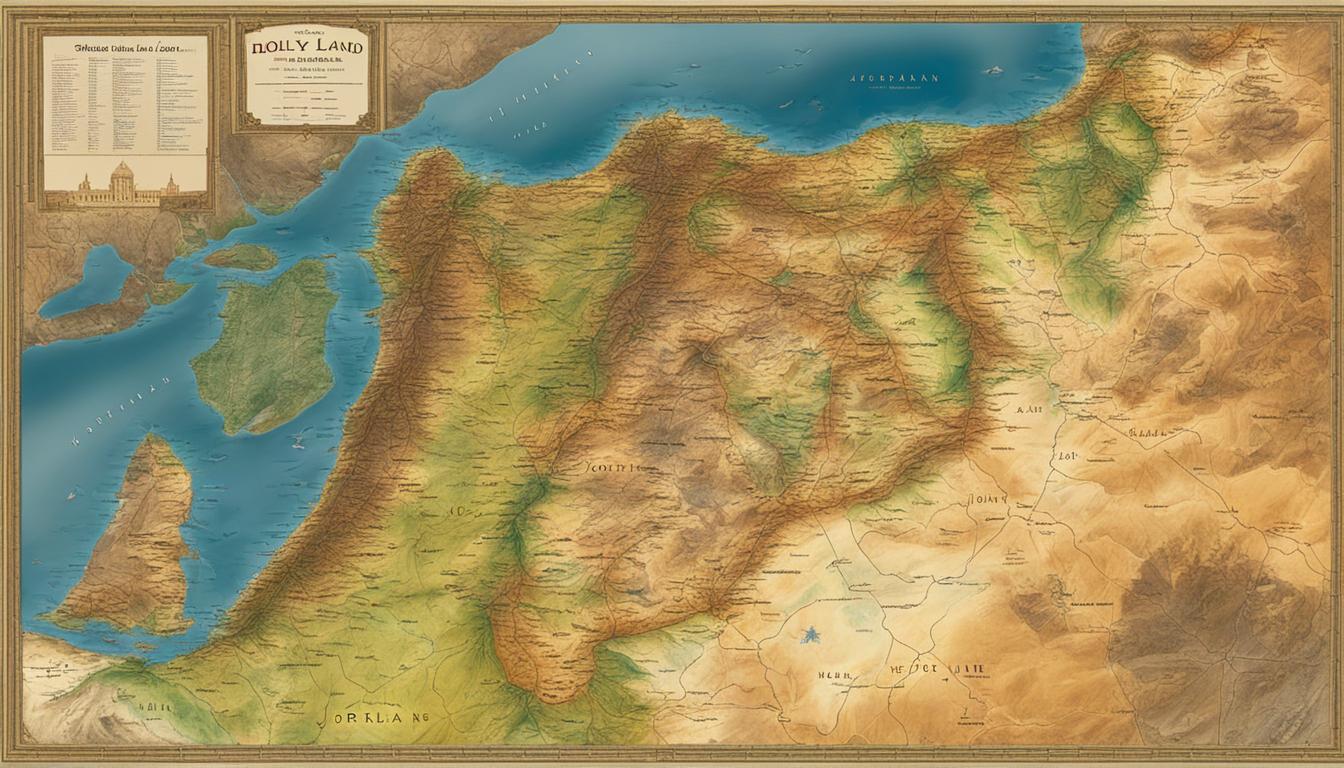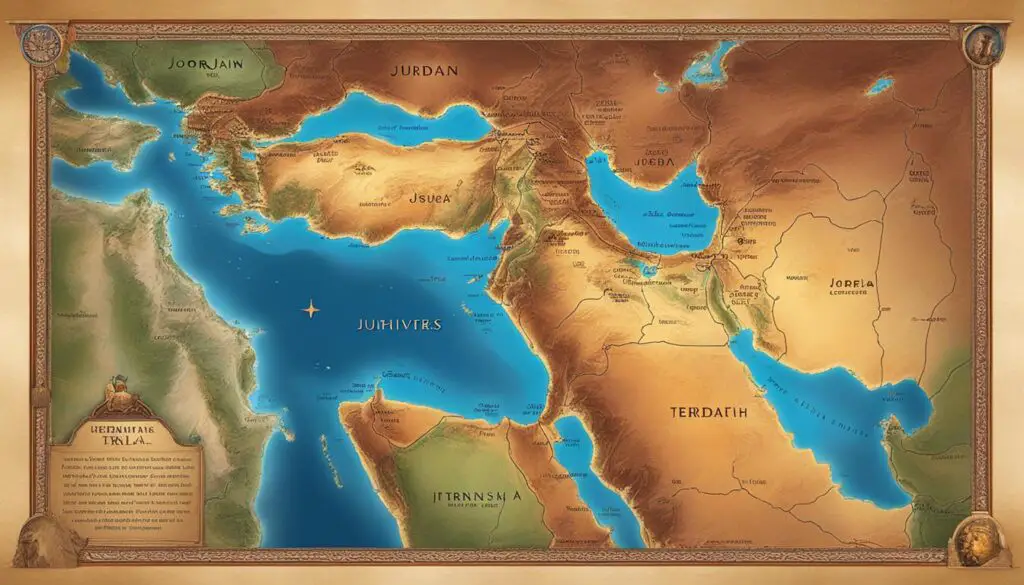
The Role of Geography in Shaping Biblical Stories
The study of biblical geography is vital for understanding the narratives and context of the Bible. It provides insights into the physical settings and locations mentioned in Scripture, enriching our interpretation of God’s work. By exploring the geographic context of biblical events, we can grasp the significance of specific places and their impact on the unfolding of God’s plan.
Key Takeaways:
- Geography plays a critical role in shaping the stories and events described in the Bible.
- Specific geographical locations in the Bible serve as reminders of God’s presence and power.
- Studying the context of biblical events enhances our understanding of the passages and their historical significance.
- Engaging with the physical settings of biblical narratives deepens our interpretation and spiritual connection.
- Geographical awareness allows us to experience spiritual formation and transformation.
The Significance of Biblical Places and Events
The lands and locations mentioned in the Bible played a significant role in shaping the narratives and events described in Scripture. God’s revelation and mission are often intricately connected to specific geographical locations. For example, Jacob’s encounters with God at Bethel and Peniel marked significant thresholds in his life, with the names of these places serving as reminders of God’s presence and power.
Additionally, tracing the journeys and experiences of biblical characters like Ruth and Naomi deepens our understanding of God’s provision and care. By studying the geographical context of biblical events, such as Bethlehem’s location and its significance in relation to trade routes and borders, we gain a deeper understanding of the passages and their historical context. The geographical references in the Bible contribute to a more comprehensive interpretation of the text, preventing over-spiritualization or allegorization.

The Geographical Significance of Biblical Places
| Biblical Place | Significance |
|---|---|
| Bethel | A place of divine encounters and spiritual transformation for Jacob |
| Peniel | The site of Jacob’s wrestling with God and receiving a new name |
| Bethlehem | The birthplace of Jesus, fulfilling prophecies and highlighting Messianic significance |
By exploring the geographical context of these places, we gain a deeper appreciation for the events and their impact. The physical settings serve as reminders of God’s presence and power, and understanding their significance enhances our interpretation of biblical narratives.
Moreover, recognizing the historical and geographical context of biblical stories helps us avoid distorting or oversimplifying their meaning. By engaging with the locations mentioned in the Bible, we can better grasp the cultural, political, and social influences that shaped the events and characters within the narrative.
The Impact of Geography on Our Spiritual Lives
Understanding the role of geography in biblical stories is crucial for our spiritual interpretation and growth. By exploring the geographic settings of these narratives, we can gain a deeper understanding of God’s work and purpose. For instance, consider how Jesus fed crowds on both the Jewish and gentile sides of the Sea of Galilee, demonstrating his heart for all people and his global mission.
Incorporating geographical awareness into our interpretation allows us to experience spiritual formation and transformation. When we recognize the significance of the biblical landscapes, we can cultivate a greater awareness of God’s presence and purpose in our own lives. By immersing ourselves in the physical settings of biblical events, the stories and teachings of Scripture become rooted in our hearts, shaping our view of God, the coming kingdom, and our role in it.
Geography also inspires us to think missionally and intentionally engage with the landscapes in which we dwell. Just as the Bible showcases God’s mission in various geographical locations, we too can discern our mission in the places we inhabit. Whether it’s our neighborhood, workplace, or community, understanding the geographic context of biblical stories encourages us to actively live out our faith and share God’s love with those around us.
FAQ
Is the study of biblical geography possible?
Yes, the study of biblical geography is not only possible but spiritually and missionally formative.
How does geography help us understand God’s work in the physical world?
By tracing God’s work in the physical world, we can better understand his work of resurrection in our lives and communities.
Why are significant locations in the Bible important?
Significant locations in the Bible serve as reminders of God’s gracious presence and power.
How does studying biblical geography enhance Bible study?
Studying biblical geography helps us engage with the setting of biblical texts in an active and immersive way, grounding our Bible study in the physical world.
What does geography reveal about God’s mission?
Geography reveals the scope of God’s mission, showcasing his heart for all people.
How does geography shape our view of God’s mission?
Geography shapes our view of the crucified and resurrected God, allowing us to understand his mission in the physical world in new and tangible ways.
How do the lands and locations mentioned in the Bible impact the narratives and events?
The lands and locations mentioned in the Bible played a significant role in shaping the narratives and events described in Scripture.
How are God’s revelation and mission connected to specific geographical locations?
God’s revelation and mission are often intricately connected to specific geographical locations.
How does the geographical context deepen our understanding of biblical characters and events?
The geographical context deepens our understanding of biblical characters and events, providing a richer understanding of God’s provision and care.
Why is studying the geographical context important for interpreting biblical texts?
Studying the geographical context is important for interpreting biblical texts as it prevents over-spiritualization or allegorization and provides historical context.
How does engaging with the physical settings of biblical events impact our spiritual lives?
Engaging with the physical settings of biblical events enhances our interpretation of the text and deepens our understanding of God’s work.
How does the geography of the Bible encourage us to think missionally?
The geography of the Bible encourages us to think missionally and intentionally engage with the landscapes where we are placed.
How does geographical awareness help us experience spiritual formation and transformation?
Geographical awareness allows the stories and sermons of Scripture to root themselves in our hearts and shape our view of God, the coming kingdom, and our role in it.
